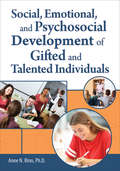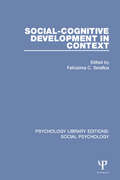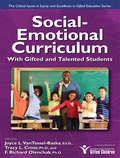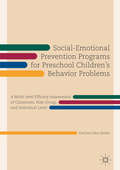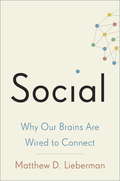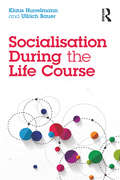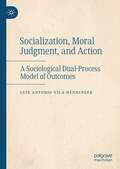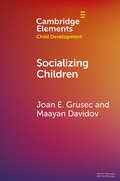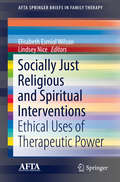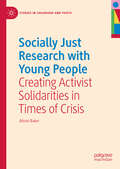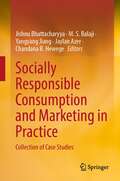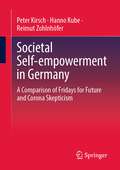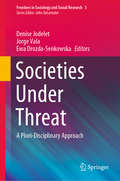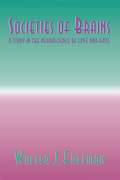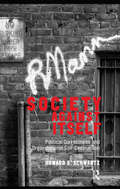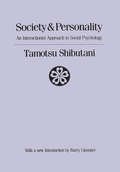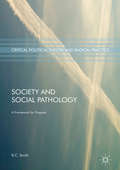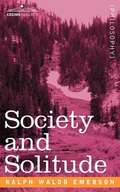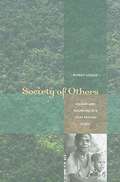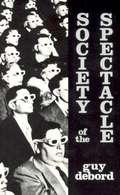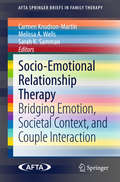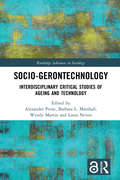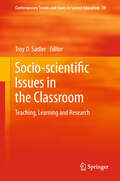- Table View
- List View
Social, Emotional, and Psychosocial Development of Gifted and Talented Individuals
by Anne RinnSocial, Emotional, and Psychosocial Development of Gifted and Talented Individuals:Merges the fields of individual differences, developmental psychology, and educational psychology with the field of gifted education.Provides a complete overview of the social, emotional, and psychosocial development of gifted and talented individuals.Explores multiple paradigmatic lenses and varying conceptions of giftedness.Serves as a comprehensive resource for graduate students, early career scholars, and teachers.Addresses implications for the field of gifted education and future research.This book is framed around four broad questions: (a) What is development?, (b) Are gifted individuals qualitatively different from others?, (c) Which psychosocial skills are necessary in the development of talent?, and (d) What effect does the environment have on the development of talent? Topics covered include developmental trajectories, personality development, social and emotional development, perfectionism, sensory sensitivity, emotional intensity, self-beliefs, motivation, systems perspective, psychosocial interventions, and counseling and mental health.
Social-Cognitive Development in Context (Psychology Library Editions: Social Psychology)
by Felicisima SeraficaThe relationship between the cognitive and social spheres of human functioning and their context has long been regarded by social and behavioural scientists as a central theoretical issue. By the early 1980s a number of empirical studies had further elucidated the nature of this relationship but no attempt had been made to present a coherent picture of the research and developments in this increasingly popular area of study. Originally published in 1982, the topics covered in this book filled the gap admirably. They present a view of the development of aspects of the self and of self-other relations and how these two lines of development interact within a given context. All the contributions attempt to portray the child’s developing awareness of the self in relation to the social world, but all consider it from different perspectives and in varying degrees of detail. This useful collection, by a number of well-known contributors, should still be of great value to students of developmental and social psychology.
Social-Emotional Curriculum With Gifted and Talented Students
by Tracy L. Cross Joyce L. VanTessel-BaskaSocial-Emotional Curriculum With Gifted and Talented Students provides a thorough introduction to methods for developing social-emotional curricula for use with gifted and talented learners in the school setting. Educational Resource
Social-Emotional Prevention Programs for Preschool Children's Behavior Problems
by Catrinel Alice ŞtefanThis book is aimed at exploring the relevance of social-emotional competencies for preventing preschool children’s behavior problems. The content provides an overview of how evidence from fundamental research on social-emotional competencies can be translated in applied research for developing prevention programs. The Social-Emotional Prevention program framework is presented as a multi-focused (child, teacher, parent), hybrid approach for both high risk and non-risk preschoolers. The book offers a systematic and in depth evaluation of SEP efficacy including classroom, risk group, and individual level effects. Hence, the proposed approach employs different research designs and statistical methods to explore how behavioral changes occur as a result of children’s participation to the intervention. Each study’s findings are discussed in terms of corresponding implications for practice in schools, but also from a broader perspective including implications for policy makers in the field of early education.
Social: Why Our Brains Are Wired to Connect
by Matthew D. LiebermanWe are profoundly social creatures - more than we know. In Social, renowned psychologist Matthew Lieberman explores groundbreaking research in social neuroscience revealing that our need to connect with other people is even more fundamental, more basic, than our need for food or shelter. Because of this, our brain uses its spare time to learn about the social world - other people and our relation to them. It is believed that we must commit 10,000 hours to master a skill. According to Lieberman, each of us has spent 10,000 hours learning to make sense of people and groups by the time we are ten. Social argues that our need to reach out to and connect with others is a primary driver behind our behavior. We believe that pain and pleasure alone guide our actions. Yet, new research using fMRI - including a great deal of original research conducted by Lieberman and his UCLA lab -- shows that our brains react to social pain and pleasure in much the same way as they do to physical pain and pleasure. Fortunately, the brain has evolved sophisticated mechanisms for securing our place in the social world. We have a unique ability to read other people's minds, to figure out their hopes, fears, and motivations, allowing us to effectively coordinate our lives with one another. And our most private sense of who we are is intimately linked to the important people and groups in our lives. This wiring often leads us to restrain our selfish impulses for the greater good. These mechanisms lead to behavior that might seem irrational, but is really just the result of our deep social wiring and necessary for our success as a species. Based on the latest cutting edge research, the findings in Social have important real-world implications. Our schools and businesses, for example, attempt to minimalize social distractions. But this is exactly the wrong thing to do to encourage engagement and learning, and literally shuts down the social brain, leaving powerful neuro-cognitive resources untapped. The insights revealed in this pioneering book suggest ways to improve learning in schools, make the workplace more productive, and improve our overall well-being. From the Hardcover edition.
Socialisation During the Life Course
by Ullrich Bauer Klaus HurrelmannThis comprehensive text highlights new developments in sociological, educational and psychological aspects of socialisation, examining how human beings as 'subjects' – experiencing, thinking and acting individuals – confront the material, social and cultural 'objects' of their environment and sustain their position. The authors provide an overview of the most important theories of socialisation, then integrate these using the Productive Processing of Reality (PPR) model. This novel approach is applied to a life course analysis, examining developmental tasks and the challenges of productive processing of the internal and external reality at various stages of development. The book also considers contexts, addressing the inequalities between different socio-economic and ethnic groups and genders, to consider how humans – with their genetic dispositions and their individual instincts and needs – solve the task of coping with the requirements of society, culture and economy while at the same time safeguarding their status as unique individuals. It is core reading for advanced students on socialisation modules in developmental or social psychology and educational sciences and is additionally of value for the professional training of sociologists, teachers and social workers. It is also relevant for all those interested in elementary questions of how the interaction between the society and the individual works; how human beings deal not only with themselves but also with their social and physical environment, and how they shape it in their own way.
Socialization, Moral Judgment, and Action: A Sociological Dual-Process Model of Outcomes
by Luis Antonio Vila-HenningerHow does culture affect action? This question has long been framed in terms of a means vs ends debate—in other words, do cultural ends or cultural means play a primary causal role in human behavior? However, the role of socialization has been largely overlooked in this debate. In this book, Vila-Henninger develops a model of how culture affects action called “The Sociological Dual-Process Model of Outcomes” that incorporates socialization. This book contributes to the debate by first providing a critical overview of the literature that explains the limitations of the sociological dual-process model and subsequent scholarship—and especially work in sociology on “schemas”. It then develops a sociological dual-process model of moral judgment that formally explains Type I processes, Type II processes, and the interaction between Type I and Type II processes. The book also expands sociological dual-process models to include a temporal dimension—the "Sociological Dual-Process Model of Outcomes". Finally, the book integrates a theory of socialization into the sociological dual-process model and creates empirical indicators that confirm Vila-Henninger’s theorization and contribute to the literature on measures of dual-process models.
Socializing Children (Elements in Child Development)
by Joan E. Grusec Maayan DavidovComplaints are often made that recommendations about how to rear children are contradictory and, therefore, not helpful. In this Element we survey the history of theory and research relevant to childrearing in an attempt to show how apparent differences can be resolved. We suggest that socialization occurs in different domains, with each domain fostering socialization in a different way. Thus there is no all-purpose principle or mechanism of socialization but, rather, different forms of relationship between child and agent that serve a different function, involve different rules for effecting behavior change, and facilitate different outcomes. Using this framework, we survey research relevant to different domains, including the roles played by parents, siblings, and peers in the socialization process. We follow this with a discussion of how culture and biology make their contribution to an understanding of domains of socialization.
Socially Just Religious and Spiritual Interventions: Ethical Uses of Therapeutic Power (AFTA SpringerBriefs in Family Therapy)
by Elisabeth Esmiol Wilson Lindsey NiceThis insightful work answers essential questions in family therapy by exploring the ethical use of religion and spirituality in the clinical context. Its justice-informed framework explores how to employ the spiritual as a source of resilience and empowerment as well as counter harmful spiritual and religious influences in situations that cause families and couples stress, particularly relating to gender, sexuality, race, culture, and identity. Powerful case studies show therapists and clients collaborating on meaning-making and comfort in the face of longstanding conflict, acute and chronic illness, estrangement, and loss. Coverage also explores the ethical responsibilities of determining whether beliefs are helpful or harmful to client mental health and offers guidelines for therapists navigating personal biases regarding faith. This vital text:· Spotlights the influence of an often-overlooked aspect of mental health· Provides detailed examples of religion and spirituality across diverse families and issues· Outlines practical strategies for integrating helpful aspects of clients’ relationship with the sacred into treatment· Offers a framework for countering harmful aspects of clients’ religious beliefs or practices· Includes interventions used with couples, parents/children, and other family units· Adds a socially just perspective on the spiritual dimension of mind/body concerns· Encourages readers’ professional development and self-reflection Addressing critical issues where belief frequently takes center stage, Socially Just Religious and Spiritual Interventions is an invaluable resource for family therapists, psychotherapists, and other professionals pursuing a socially just, clinically relevant approach to spiritual and religious therapeutic integration.
Socially Just Research with Young People: Creating Activist Solidarities in Times of Crisis (Studies in Childhood and Youth)
by Alison BakerThis book bridges the fields of critical youth studies, community psychology, and sociology to offer a transdisciplinary analysis of youth voice, participation, and activism, as well as of creative and inclusive knowledge-making practices. Presented in three parts, the book traces our journey of praxis as we documented the narratives and testimonies of young people and then mobilised this knowledge to co-imagine and co-create a Youth Participatory Action Research (YPAR) collective aimed at fostering connection and healing during the stringent lockdowns of 2020 in Victoria, Australia. Community building and art-making became central to memorialising their experiences of grief and loss, whilst also opening up new ways of seeing, being and doing. With no end in sight to our current coalescence of crises, this book serves as an invitation to those working alongside young people to consider what we must carry with us if we are to reimagine and remake our world.
Socially Responsible Consumption and Marketing in Practice: Collection of Case Studies
by Jishnu Bhattacharyya M. S. Balaji Yangyang Jiang Jaylan Azer Chandana R. HewegeThe book provides an overview of socially responsible consumption and marketing, as well as a collection of teaching cases that discuss and emphasize how 21st-century organizations, both for-profit and non-profit, are addressing socially responsible consumers and meeting their changing needs while remaining profitable. Consumers, governments, academics, and practitioners are becoming more interested in promoting positive social changes through consumption. As a result, this book aims to understand the practice of marketing in bringing about positive social change through real-life case studies. Consumption by socially responsible consumers who care about the social good is unique, not only because of its inter-disciplinary and substantive subject matter but also because it presents challenges and pushes organizations to make significant changes in the ways they have been accomplishing organizational activities in the twenty-first century, from procurement to production to sales and services. The book goes beyond individual consumers and their lifestyles to promote the scope of discussing marketing strategies. It seeks to comprehend how people consume and how socially responsible consumption is conceived. The case studies present and pursue integrated solutions for more sustainable consumption. This is a must-read for marketers who want to reach out to socially responsible consumers.
Societal Self-empowerment in Germany: A Comparison of Fridays for Future and Corona Skepticism
by Reimut Zohlnhöfer Peter Kirsch Hanno KubeMost recently, various groups have drawn attention to their political causes by demonstratively breaking the law, whether it is violating compulsory education in Fridays for Future demonstrations or refusing to abide by pandemic containment measures among critics of the Corona policy. This book explores what lies behind these rule-breaking events: supporters of the Fridays for Future movement, while dissatisfied with climate policy, are well integrated into the political system; people who may not abide by Corona rules, on the other hand, sometimes exhibit considerable alienation from and distrust of the political system.
Societies Under Threat: A Pluri-Disciplinary Approach (Frontiers in Sociology and Social Research #3)
by Jorge Vala Denise Jodelet Ewa Drozda-SenkowskaThis book illuminates the importance of threat on the representation of everyday life, from an interdisciplinary perspective. Divided into three parts, the book sets out by addressing the conceptual aspects of threat and by opening views on phenomena and social processes associated with threat. It shows how threat constitutes an analytical category that simultaneously involves social, psychological, religious, historical and political factors, and calls for a sufficiently broad conceptual definition to integrate pluri-disciplinary contributions. The second part focuses on the building of threats, mainly the environmental threats that have reached a tragic dimension today and are a core aspect of world concerns, the contemporary global terrorism, the migrations and the challenges these bring to contemporary societies, as well as the threats associated with the emergence of nationalism and the diverse aspects of excluding the Other. The final part examines the coping strategies, including oblivion, denial and defiance associated with different sources of threats, for instance those arising from epidemic and collective diseases, financial technology, natural disasters and collective traumas.
Societies of Brains: A Study in the Neuroscience of Love and Hate (INNS Series of Texts, Monographs, and Proceedings Series)
by Walter J. FreemanThis monograph from a leading neuroscientist and neural networks researcher investigates and offers a fresh approach to the perplexing scientific and philosophical problems of minds and brains. It explains how brains have evolved from our earliest vertebrate ancestors. It details how brains provide the basis for successful comprehension of the environment, for the formulation of actions and prediction of their consequences, and for cooperating or competing with other beings that have brains. The book also offers observations regarding such issues as: * how and why people fall in and out of love; * the biological basis for experiencing feelings of love and hate; and * how music and dance have provided the ancestral technology for forming social groups such as tribes and clans. The author reviews the history of the mind-brain problem, and demonstrates how the new sciences of behavioral electrophysiology and nonlinear dynamics -- combined with the latest computer technology -- have made it possible for us to observe brains in action. He also provides an answer to the question: What happens to a stimulus after it enters the brain? The answer: The stimulus triggers the construction of a percept and is then washed away. All that we know is what our brains construct for us by neurodynamics. Brains are not logical devices that process information. They are dynamical systems that create meaning through interactions with the environment -- and each other. The book shows how the learning process by which brains construct meaning tends to isolate brains into self-centered worlds, and how nature has provided a remedy -- first appearing in mammals as a mechanism for pair-bonding -- to ensure reproduction of the young dependent on parents. The remedy is based in the neurochemistry of sex which serves to dissolve belief structures in order to open the way for new patterns of understanding and behavior. Individuals experience these changes in various ways, such as falling in love, collegiate indoctrination, tribal bonding, brain washing, political or religious conversions, and related types of socialization. The highest forms of meaning for humans come through these social attachments.
Society Against Itself: Political Correctness and Organizational Self-Destruction
by Howard S. Schwartz"Political correctness" involves much more than a restriction of speech. It represents a broad cultural transformation, a shift in the way people understand things and organize their lives; a change in the way meaning is made. The problem addressed in this book is that, for reasons the author explores, some ways of making "meaning" support the creation and maintenance of organization, while others do not. Organizations are cultural products and rely upon psychological roots that go very deep. The basic premise of this book is that organizations are made up of the rules, common understandings, and obligations that "the father" represents, and which are given meaning in the oedipal dynamic. In anti-oedipal psychology, however, they are seen as locuses of deprivation and structures of oppression. Anti-oedipal meaning, then, is geared toward the destruction of organization.
Society and Personality: Interactionist Approach to Social Psychology
by Tamotsu ShibutaniBeing an "interactionist" approach to social psychology, Society and Personality deals with people, not as isolated individuals, but as participants in groups. The aim of the book is to help the reader develop an orderly perspective—a consistent point of view from which to see his (or her) own conduct and that of his (or her) fellows. Propositions about behavior seen from the viewpoint are presented, and relevant evidence, both descriptive and experimental, is examined and evaluated. The author draws upon the two great intellectual traditions of pragmatism and psychoanalysis, and attempts to integrate them into a single, consistent approach. All concepts are reduced to behavioristic terms—defined always in terms of what people do. In this way, it is possible to draw freely on these two schools, and at the same time, avoid much of the jargon of both. Other approaches to the study of human behavior are frequently mentioned and sometimes discussed, but the objective is to give the reader one perspective rather than confuse him with many. Of course, this standpoint is presented as only one of many possible ways of looking at people. Although the book's basic ideas are drawn from two main schools of psychological thought, relevant material has been gathered from other sources as well—sociology, ethnography, linguistics, experimental psychology, and clinical data from psychiatry. One very important extra feature is the List of Personal Documents, compiled by the author to guide interested readers to first-person accounts—biographies, diaries, clinical records—each of which provides a valuable record of human experience.
Society and Social Pathology: A Framework for Progress (Critical Political Theory and Radical Practice)
by R. C. SmithThis book offers one of the most comprehensive studies of social pathology to date, following a cross-disciplinary and methodologically innovative approach. It is written for anyone concerned with understanding current social conditions, individual health, and how we might begin to collectively conceive of a more reconciled postcapitalist world.Drawing reference from the most up-to-date studies, Smith crosses disciplinary boundaries from cognitive science and anthropology to critical theory, systems theory and psychology. Opening with an empirical account of numerous interlinked carises from mental health to the physiological effects of environmental pollution, Smith argues that mainstream sociological theories of pathology are deeply inadequate. Smith introduces an alternative critical conception of pathology that drills to the core of how and why society is deeply ailing. The book concludes with a detailed account of why a progressive and critical vision of social change requires a “holistic view” of individual and societal transformation. Such a view is grounded in the awareness that a sustainable transition to postcapitalism is ultimately a many-sided (social, individual, and structural) healing process.
Society and Solitude
by Ralph Waldo EmersonPerhaps no writer has so dramatically shaped the course of American philosophy as Ralph Waldo Emerson, whose meditations on spirituality, freedom, and the power of knowledge have informed and inspired generations of activists, scholars, and common people. <P><P>Published in 1870, Society and Solitude is Emerson's last great work, a collection of lectures he delivered on tour, in which he found profound insight on such seemingly prosaic topics as Art, Eloquence, Domestic Life, Books, Courage, Success, and "A man builds a fine house; and now he has a master, and a task for life; he is to furnish, watch, show it, and keep it in repair, the rest of his days," says Emerson in his lecture here on "Works and Days." Such penetrating wit and American poet and philosopher Ralph Waldo Emerson (1803-1882) was a driving force behind the Transcendental Movement of the early 18th century. <P>[This text is listed as an example that meets Common Core Standards in English language arts in grades 11-12 at http://www.corestandards.org.]
Society and the Unconscious: Cultural Psychological Insights
by Dieter SandnerThis book will interest anyone seeking a comprehensive understanding of the psychological relationship between individual psychological dynamics, social structure and the unconscious collective paradigms. It focuses on an analysis of patriarchal culture, which is, as it were, the psychological enclosure in which all individual and collective processes take place.Starting from the genesis and current structure of this culture, the strong social changes of the last 50 years are examined:the change in relations between men and womensocial relations in terms of solidarity and desolidarisationthe situation of social security the social and political power relations, andthe economic dynamics.At the same time, collective fantasies are elaborated that emerge from the socio-structural changes. The basis of the study is psychoanalytical cultural theory in the form of a cultural-critical deconstruction of its fundamental assumptions. In 16 interesting chapters, essential questions of psychological cultural theory are answered and practical applications of this theory to current sociostructural processes are shown.
Society of Others: Kinship and Mourning in a West Papuan Place
by Rupert StaschThis anthropological book about the Korowai, offers a picture of Korowai lives sharply at odds with stereotypes of "tribal" societies. Rupert Stasch shows that in this society, people organize their connections to each another around otherness.
Society of the Spectacle
by Guy DebordThis book talks about political and cultural theory and on modernity, capitalism, and everyday life in the late 20th century.
Society, Culture and the Auditory Imagination in Modern France
by Ingrid SykesThis book examines the striking way in which medical and scientific work on hearing in eighteenth and nineteenth-century France helped to shape modern French society and culture. Contemporary scientists and anatomists had to come to terms with a new kind of transformative physiology within the material site of the human ear, one that had the potential to construct space and place in the most powerful way imaginable. Auditory medical specialists found themselves at the center of pivotal philosophical, political and social debates on how the individual citizen might use their ears to reach out to those around them constructing broader, protective models of social reform. Sykes makes the case that of all the senses hearing offered the greatest resources for remodelling the idea of the universal human condition within the modern French historical setting.
Socio-Emotional Relationship Therapy
by Carmen Knudson-Martin Melissa A. Wells Sarah K. SammanThis path-breaking volume introduces Socio-Emotional Relationship Therapy for clinical work with troubled couples. Practice-focused and engaging, it integrates real-world knowledge of the intersections of gender, culture, power, and identity in relationships with empirical findings on the neurobiology of attraction. Case examples detail the process of therapists in the moment as they develop both their clinical skills and their understanding of the social contexts fueling couples' difficulties. Applications of the method, which can be used with same-sex couples as well as heterosexual ones, are shown in addressing infidelity, tapping into partners' spirituality, and modeling and encouraging mutual respect and support. Among the topics covered: Undoing gendered power in heterosexual couple relationships. Interpersonal neurobiology, couples, and the societal context. How gender discourses hijack couple therapy--and how it can be avoided. How SERT therapists develop interventions that address the larger context. Building a circle of care in same-sex couple relationships. Couple therapy with adult survivors of child abuse: gender, power, and trust. Socio-Emotional Relationship Therapy opens out practical new possibilities for marriage and family therapists, clinical psychologists, social workers, and counselors seeking ideas for more meaningful couples work.
Socio-gerontechnology: Interdisciplinary Critical Studies of Ageing and Technology (Routledge Advances in Sociology)
by Alexander PeineSocial change in the twenty-first century is shaped by both demographic changes associated with ageing societies and significant technological change and development. Outlining the basic principles of a new academic field, Socio-gerontechnology, this book explores common conceptual, theoretical and methodological ideas that become visible in the critical scholarship on ageing and technology at the intersection of Age Studies and Science and Technology Studies (STS).Comprised of 15 original chapters, three commentaries and an afterword, the book explores how ageing and technology are already interconnected and constantly being intertwined in Western societies. Topics addressed cover a broad variety of socio-material domains, including care robots, the use of social media, ageing-in-place technologies, the performativity of user involvement and public consultations, dementia care and many others. Together, they provide a unique understanding of ageing and technology from a social sciences and humanities perspective and contribute to the development of new ontologies, methodologies and theories that might serve as both critique of and inspiration for policy and design.International in scope, including contributions from the United Kingdom, Canada, the United States, Australia, Germany, Norway, Denmark, Austria, the Netherlands, Spain and Sweden, Socio-gerontechnology is an agenda-setting text that will provide an introduction for students and early career researchers as well as for more established scholars who are interested in ageing and technology. Chapters 3, 5, and 15 of this book are freely available as downloadable Open Access PDFs at http://www.taylorfrancis.com under a Creative Commons Attribution-Non Commercial-No Derivatives (CC-BY-NC-ND) 4.0 license.
Socio-scientific Issues in the Classroom
by Troy D. SadlerSocio-scientific issues (SSI) are open-ended, multifaceted social issues with conceptual links to science. They are challenging to negotiate and resolve, and they create ideal contexts for bridging school science and the lived experience of students. This book presents the latest findings from the innovative practice and systematic investigation of science education in the context of socio-scientific issues. Socio-scientific Issues in the Classroom: Teaching, Learning and Research focuses on how SSI can be productively incorporated into science classrooms and what SSI-based education can accomplish regarding student learning, practices and interest. It covers numerous topics that address key themes for contemporary science education including scientific literacy, goals for science teaching and learning, situated learning as a theoretical perspective for science education, and science for citizenship. It presents a wide range of classroom-based research projects that offer new insights for SSI-based education. Authored by leading researchers from eight countries across four continents, this book is an important compendium of syntheses and insights for veteran researchers, teachers and curriculum designers eager to advance the SSI agenda.
